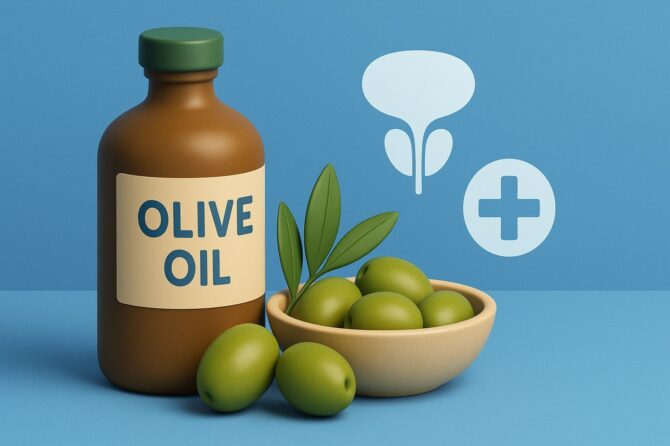
Olive (Olea europaea) and Health: A Focus on Men’s Health, Prostate & Urinary Outcomes
The olive tree (Olea europaea) yields foods and extracts—extra-virgin olive oil (EVOO), table olives, and olive-leaf preparations—rich in monounsaturated fat (primarily oleic acid) and phenolic compounds (notably oleocanthal, hydroxytyrosol, tyrosol, and oleuropein). Together, these nutrients and phytochemicals underpin many of the Mediterranean diet’s cardiometabolic and anti-inflammatory benefits, with growing (but uneven) evidence for men’s sexual health and limited, preliminary evidence in prostate and urinary domains. High-quality trials support cardiovascular risk reduction and blood-pressure lowering; evidence in prostate outcomes is mixed, with mechanistic and observational signals but few definitive clinical trials.
Key Bioactives & Mechanisms (What’s “active” in olive foods/extracts?)
- Oleic acid (MUFA): Improves lipid profile and cardiometabolic markers when replacing saturated fat.
- Oleocanthal (in EVOO): Ibuprofen-like COX inhibition; throat “sting” is a sensory marker of this compound.
- Hydroxytyrosol & Tyrosol: Potent antioxidants; hydroxytyrosol shows anti-proliferative actions in prostate cancer cell models (apoptosis, cell-cycle arrest).
- Oleuropein (leaf, unprocessed fruit): Antioxidant/anti-inflammatory; broad antimicrobial activity in vitro; multiple metabolic effects in animal/human studies.
Established Health Effects
Cardiovascular risk reduction
The PREDIMED randomized trial assigned thousands of older adults at high cardiovascular risk to a Mediterranean diet supplemented with extra-virgin olive oil or nuts versus a low-fat control. After several years, major cardiovascular events were significantly lower in both Mediterranean diet groups; the EVOO-supplemented group had the strongest protective effects. This is among the most persuasive diet-based primary prevention findings to date.
Blood pressure, lipids, and vascular function
Randomized, double-blind, controlled crossover trials of olive leaf extract (OLE) in pre-hypertensive adults report modest reductions in 24-h systolic/diastolic blood pressure alongside improvements in LDL cholesterol and triglycerides. Meta-analyses of randomized controlled trials corroborate these benefits.
Men’s Health
Sexual and endothelial function
Adherence to a Mediterranean dietary pattern—where EVOO is the principal fat—has been associated with better erectile function in men with metabolic syndrome and improved endothelial measures in clinical investigations. While these studies evaluate overall diet patterns rather than olive products alone, EVOO is a hallmark component.
Androgen profile
A randomized nutritional intervention in healthy men comparing butter (run-in) to EVOO (or argan oil) for three weeks found increases in serum testosterone and luteinizing hormone with EVOO. These short-term data are intriguing but preliminary, and they do not establish long-term clinical effects on fertility or hypogonadism.
Prostate Health
Cancer risk and progression: what we know (and don’t)
- Epidemiology is mixed. Some studies indicate no clear association between olive oil use and prostate cancer risk, while others suggest potential benefit of overall Mediterranean patterns rather than olive oil per se.
- Active surveillance cohorts. In men with localized prostate cancer on active surveillance, greater adherence to the Mediterranean diet has been associated with lower odds of grade progression.
- Mechanistic & preclinical work. Olive phenolics (e.g., hydroxytyrosol, oleuropein) can reduce proliferation and induce apoptosis in prostate cancer cell models and animal studies; translational relevance requires human trials.
Benign prostatic hyperplasia (BPH) and LUTS
Data directly testing olive products for BPH are scarce. An exploratory study of lycopene-enriched EVOO reported non-significant improvements in PSA and lower urinary tract symptoms; older case–control data found no overall association between olive oil intake and BPH risk. Overall, clinical evidence is limited and inconclusive.
Urinary Tract & Kidney-Related Findings
- Diuretic potential (preclinical). Olive-leaf extracts show diuretic effects in animal models and cell systems, suggesting a plausible mechanism; human diuretic trials are lacking.
- Antimicrobial properties (in vitro). Olive leaf constituents inhibit growth and biofilms of several pathogens, including E. coli, common in UTIs; however, clinical trials for UTI treatment/prevention are not available, so use should be considered adjunctive at best.
Bottom line: For urinary or prostate indications, evidence is not yet robust; benefits, if present, likely come indirectly via systemic anti-inflammatory/cardiometabolic effects rather than direct prostate/urinary actions.
Practical Uses & Ingestion Methods
1) Extra-virgin olive oil (food-first approach)
- How much? In PREDIMED, participants received about 1 liter/week of EVOO (roughly 3–4 Tbsp/day); higher intake correlated with fewer cardiovascular events. For everyday use, 1–2 Tbsp/day replacing butter/animal fats is a realistic, sustainable target.
- How to use it: Dress salads, drizzle on vegetables/legumes, cook low-to-moderate-heat sautés. EVOO is relatively oxidation-stable due to phenolics; culinary use within typical temperatures is appropriate.
- Quality tips: Choose “extra-virgin,” early-harvest, cold-extracted oils in dark bottles; a peppery throat “sting” suggests oleocanthal content (an anti-inflammatory marker).
2) Olive leaf extract (supplement route)
- Blood pressure/lipids: RCT doses include 500 mg twice daily of standardized OLE (total 1,000 mg/day) or products delivering around 136 mg oleuropein/day, showing modest BP and lipid improvements.
- Glycemic effects: Small trials suggest improved insulin sensitivity in overweight men, but diabetes management should not rely on OLE alone.
3) Table olives
Source of fiber and phenolics (lower than EVOO by serving), but watch sodium depending on curing/brining.
Safety, Tolerability & Interactions
- EVOO & table olives: Generally safe as foods; energy-dense (≈120 kcal/Tbsp). The throat “sting” from pungent EVOO reflects oleocanthal and is benign; those with reflux may prefer milder oils.
- Olive leaf extract: Typically well tolerated in studies; may potentiate antihypertensive and hypoglycemic medications (monitor blood pressure and glucose if you use OLE alongside such drugs). Avoid in pregnancy/lactation due to limited data.
- Allergy: Olive pollen can cause respiratory allergy; this is distinct from food reactions.
Clinical note: For heart health, EVOO as a staple fat within a Mediterranean diet has the strongest evidence. For prostate/urinary concerns, current human data are insufficient for specific therapeutic claims; olive products should complement—not replace—standard care.
Take-Home for Men’s & Prostate Health
- Strongest evidence: cardiovascular benefits of EVOO-rich Mediterranean eating, which indirectly supports erectile function via vascular health.
- Mixed/limited evidence: direct prostate cancer or BPH outcomes; promising mechanistic data exist for olive phenolics, but clinical trials are sparse.
- Emerging adjuncts: Olive leaf extract may modestly improve blood pressure/lipids; urinary antimicrobial/diuretic signals are preclinical and not evidence-based treatments for UTIs or LUTS.


Leave a reply